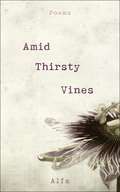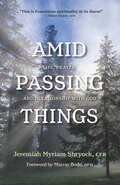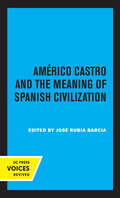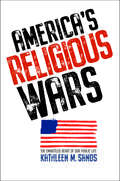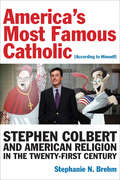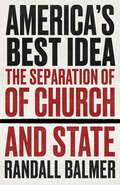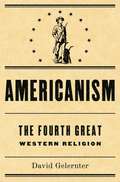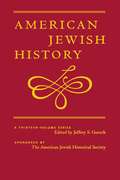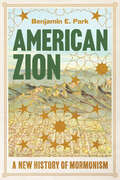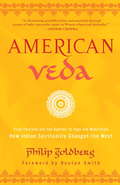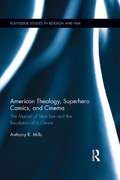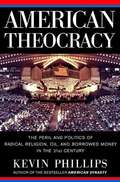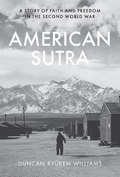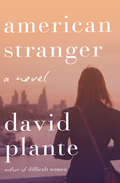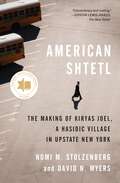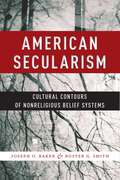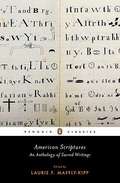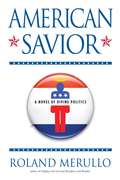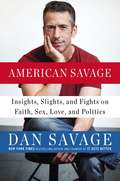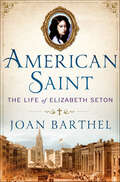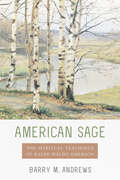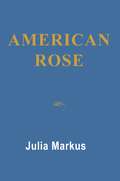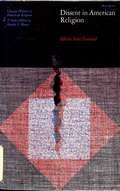- Table View
- List View
Amid Thirsty Vines: Poems
by AlfaThemes of self-discovery, tending the garden of the soul, and nurturing yourself into blossom, Amid Thirsty Vines by Instagram poetry star Alfa is the collection you need to feel the power of the beautiful flowers within you, and to find the love you deserve. This volume belongs in the collection of every modern poetry fan.
Amid Passing Things: Life, Prayer, and Relationship with God
by Murray Bodo Jeremiah Myriam ShryockAmid Passing Things is a collection of meditations on all the ways God enters our lives, even when we're unaware. Based on his own life experiences, Franciscan friar Jeremiah Shryock offers both struggles and joys that come in a life that's consciously encountering God—the Holy One all around us—not in some far-off place, but right here and now in this life, amid passing things.
Americo Castro and the Meaning of Spanish Civilization
by José Rubia BarciaThis title is part of UC Press's Voices Revived program, which commemorates University of California Press’s mission to seek out and cultivate the brightest minds and give them voice, reach, and impact. Drawing on a backlist dating to 1893, Voices Revived makes high-quality, peer-reviewed scholarship accessible once again using print-on-demand technology. This title was originally published in 1976.
America’s Religious Wars: The Embattled Heart of Our Public Life
by Kathleen M. SandsHow American conflicts about religion have always symbolized our foundational political values When Americans fight about “religion,” we are also fighting about our conflicting identities, interests, and commitments. Religion-talk has been a ready vehicle for these conflicts because it is built on enduring contradictions within our core political values. The Constitution treats religion as something to be confined behind a wall, but in public communications, the Framers treated religion as the foundation of the American republic. Ever since, Americans have translated disagreements on many other issues into an endless debate about the role of religion in our public life. Built around a set of compelling narratives—George Washington’s battle with Quaker pacifists; the fight of Mormons and Catholics for equality with Protestants; Teddy Roosevelt’s concept of land versus the Lakota’s concept; the creation-evolution controversy; and the struggle over sexuality—this book shows how religion, throughout American history, has symbolized, but never resolved, our deepest political questions.
America’s Most Famous Catholic: Stephen Colbert and American Religion in the Twenty-First Century (Catholic Practice In North America Ser.)
by Stephanie N. BrehmFor nine years, Stephen Colbert’s persona, “Colbert”—a Republican superhero and parody of conservative political pundits—informed audiences on current events, politics, social issues, and religion while lampooning conservative political policy, biblical literalism, and religious hypocrisy. As devout, vocal, and authoritative lay Catholics, religion is central to both the actor and his most famous character. Yet many viewers wonder, “Is Colbert a practicing Catholic in real life or is this part of his act?” America’s Most Famous Catholic (According to Himself) examines the ways in which Colbert challenges perceptions of Catholicism and Catholic mores through his faith and comedy.Religion and the foibles of religious institutions have served as rich fodder for scores of comedians over the years. What set “Colbert” apart on his Comedy Central show, The Colbert Report, was that his critical observations were made more powerful and harder to ignore because he approached religious material not from the predictable stance of the irreverent secular comedian but from his position as one of the faithful. He is a Catholic celebrity who can bridge critical outsider and participating insider, neither fully reverent nor fully irreverent.Providing a digital media ethnography and rhetorical analysis of Stephen Colbert and his character from 2005 to 2014, author Stephanie N. Brehm examines the intersection between lived religion and mass media, moving from an exploration of how Catholicism shapes Colbert’s life and world toward a conversation about how “Colbert” shapes Catholicism. Brehm provides historical context by discovering how “Colbert” compares to other Catholic figures, such Don Novello, George Carlin, Louis C.K., and Jim Gaffigan, who have each presented their views of Catholicism to Americans through radio, film, and television. The last chapter provides a current glimpse of Colbert on The Late Show, where he continues to be a voice for Catholicism on late night, now to an even broader audience.America’s Most Famous Catholic (According to Himself) also explores how Colbert carved space for Americans who currently define their religious lives through absence, ambivalence, and alternatives. Brehm reflects on the complexity of contemporary American Catholicism as it is lived today in the often-ignored form of Catholic multiplicity: thinking Catholics, cultural Catholics, cafeteria Catholics, and lukewarm Catholics, or what others have called Colbert Catholicism, an emphasis on the joy of religion in concert with the suffering. By examining the humor in religion, Brehm allows us to see clearly the religious elements in the work and life of comedian Stephen Colbert.
America’s Last Call: On the Brink of a Financial Holocaust
by David Wilkerson(Quoted from the Author) "A majority of Americans have concluded, 'Morals do not count. Let our leaders do as they please; just give us a booming economy!' God is about to crush this abominable American mindset. Soon the American dream will become the American nightmare. Yet through it all, those who know God can be assured of constant protection and provision from His hands." Even though Wilkerson published his book in 1998, his predictions about the U.S. economy are surprisingly accurate. and therefore, are worth investigating.
America’s Best Idea: The Separation of Church and State
by Randall BalmerA historian and ordained Episcopal priest offers everything you need to know for shaping and defending your own beliefs on the role of religion in American lifeFilled with stories from America's struggle for religious freedom most readers have never heard before and perfect for fans of Jesus and John Wayne and On TyrannyThe 1st Amendment to the US Constitution codified the principle that government should play no role in favoring or supporting any religion, while allowing free exercise of all religions (including unbelief). More than 200 years later, the results from this experiment are overwhelming: The separation of church and state has shielded the government from religious factionalism, and the United States boasts a diverse religious culture unmatched in the world.But changes have been taking place at an accelerating pace in recent years. The current Supreme Court has shifted away from excluding the influence and practice of religion at public institutions and in our laws and policies, and moved dramatically toward protecting the inclusion and promotion of religion in publicly funded undertakings.Moreover, adherents to a Christian Nationalism ideology have grown more vocal and emboldened, and are increasingly moving into positions of power.Randall Balmer, one of the premier historians of religion in America, reviews both the history of the separation of church and state and various attempts to undermine that wall. Despite the fact that the 1st Amendment and the separation of church and state has served the nation remarkably well, he argues, its future is by no means assured.
Americanism: The Fourth Great Western Religion
by David GelernterWhat does it mean to "believe" in America? Why do we always speak of our country as having a mission or purpose that is higher than other nations? Modern liberals have invested a great deal in the notion that America was founded as a secular state, with religion relegated to the private sphere. David Gelernter argues that America is not secular at all, but a powerful religious idea--indeed, a religion in its own right. Gelernter argues that what we have come to call "Americanism" is in fact a secular version of Zionism. Not the Zionism of the ancient Hebrews, but that of the Puritan founders who saw themselves as the new children of Israel, creating a new Jerusalem in a new world. Their faith-based ideals of liberty, equality, and democratic governance had a greater influence on the nation's founders than the Enlightenment. Gelernter traces the development of the American religion from its roots in the Puritan Zionism of seventeenth-century New England to the idealistic fighting faith it has become, a militant creed dedicated to spreading freedom around the world. The central figures in this process were Abraham Lincoln, Teddy Roosevelt, and Woodrow Wilson, who presided over the secularization of the American Zionist idea into the form we now know as Americanism. If America is a religion, it is a religion without a god, and it is a global religion. People who believe in America live all over the world. Its adherents have included oppressed and freedom-loving peoples everywhere--from the patriots of the Greek and Hungarian revolutions to the martyred Chinese dissidents of Tiananmen Square. Gelernter also shows that anti-Americanism, particularly the virulent kind that is found today in Europe, is a reaction against this religious conception of America on the part of those who adhere to a rival religion of pacifism and appeasement. A startlingly original argument about the religious meaning of America and why it is loved--and hated--with so much passion at home and abroad.
American Zionism: American Jewish History (American Jewish History)
by Jeffrey S. GurockFirst Published in 1998. Routledge is an imprint of Taylor & Francis, an informa company.
American Zion: A New History of Mormonism
by Benjamin E. ParkNew Yorker — "The Best Books We’ve Read in 2024 So Far" The first major history of Mormonism in a decade, drawing on newly available sources to reveal a profoundly divided faith that has nevertheless shaped the nation. The Church of Jesus Christ of Latter-day Saints was founded by Joseph Smith in 1830 in the so-called “burned-over district” of upstate New York, which was producing seers and prophets daily. Most of the new creeds flamed out; Smith’s would endure, becoming the most significant homegrown religion in American history. How Mormonism succeeded is the story told by historian Benjamin E. Park in American Zion. Drawing on sources that have become available only in the last two decades, Park presents a fresh, sweeping account of the Latter-day Saints: from the flight to Utah Territory in 1847 to the public renunciation of polygamy in 1890; from the Mormon leadership’s forging of an alliance with the Republican Party in the wake of the New Deal to the “Mormon moment” of 2012, which saw the premiere of The Book of Mormon musical and the presidential candidacy of Mitt Romney; and beyond. In the twentieth century, Park shows, Mormons began to move ever closer to the center of American life, shaping culture, politics, and law along the way. But Park’s epic isn’t rooted in triumphalism. It turns out that the image of complete obedience to a single, earthly prophet—an image spread by Mormons and non-Mormons alike—is misleading. In fact, Mormonism has always been defined by internal conflict. Joseph Smith’s wife, Emma, inaugurated a legacy of feminist agitation over gender roles. Black believers petitioned for belonging even after a racial policy was instituted in the 1850s that barred them from priesthood ordination and temple ordinances (a restriction that remained in place until 1978). Indigenous and Hispanic saints—the latter represent a large portion of new converts today—have likewise labored to exist within a community that long called them “Lamanites,” a term that reflected White-centered theologies. Today, battles over sexuality and gender have riven the Church anew, as gay and trans saints have launched their own fight for acceptance. A definitive, character-driven work of history, American Zion is essential to any understanding of the Mormon past, present, and future. But its lessons extend beyond the faith: as Park puts it, the Mormon story is the American story.
American Veda: From Emerson and the Beatles to Yoga and Meditation How Indian Spirituality Changed the West
by Philip GoldbergIn February 1968 the Beatles went to India for an extended stay with their new guru, Maharishi Mahesh Yogi. It may have been the most momentous spiritual retreat since Jesus spent those forty days in the wilderness. With these words, Philip Goldberg begins his monumental work, American Veda, a fascinating look at India’s remarkable impact on Western culture. This eye-opening popular history shows how the ancient philosophy of Vedanta and the mind-body methods of Yoga have profoundly affected the worldview of millions of Americans and radically altered the religious landscape. What exploded in the 1960s actually began more than two hundred years earlier, when the United States started importing knowledge as well as tangy spices and colorful fabrics from Asia. The first translations of Hindu texts found their way into the libraries of John Adams and Ralph Waldo Emerson. From there the ideas spread to Henry David Thoreau, Walt Whitman, and succeeding generations of receptive Americans, who absorbed India’s “science of consciousness” and wove it into the fabric of their lives. Charismatic teachers like Swami Vivekananda and Paramahansa Yogananda came west in waves, prompting leading intellectuals, artists, and scientists such as Aldous Huxley, Joseph Campbell, Allen Ginsberg, J. D. Salinger, John Coltrane, Dean Ornish, and Richard Alpert, aka Ram Dass, to adapt and disseminate what they learned from them. The impact has been enormous, enlarging our current understanding of the mind and body and dramatically changing how we view ourselves and our place in the cosmos. Goldberg paints a compelling picture of this remarkable East-to-West transmission, showing how it accelerated through the decades and eventually moved from the counterculture into our laboratories, libraries, and living rooms. Now physicians and therapists routinely recommend meditation, words like karma and mantra are part of our everyday vocabulary, and Yoga studios are as ubiquitous as Starbuckses. The insights of India’s sages permeate so much of what we think, believe, and do that they have redefined the meaning of life for millions of Americans—and continue to do so every day. Rich in detail and expansive in scope, American Veda shows how we have come to accept and live by the central teaching of Vedic wisdom: “Truth is one, the wise call it by many names.”
American Transcendentalists: Their Prose and Poetry
by Perry MillerA compilation of American transcendental poetry and prose--Emerson, Thoreau, and others.
American Theology, Superhero Comics, and Cinema: The Marvel of Stan Lee and the Revolution of a Genre (Routledge Studies in Religion and Film)
by Anthony MillsStan Lee, who was the head writer of Marvel Comics in the early 1960s, co-created such popular heroes as Spider-Man, Hulk, the X-Men, the Fantastic Four, Iron Man, Thor, and Daredevil. This book traces the ways in which American theologians and comic books of the era were not only both saying things about what it means to be human, but, starting with Lee they were largely saying the same things. Author Anthony R. Mills argues that the shift away from individualistic ideas of human personhood and toward relational conceptions occurring within both American theology and American superhero comics and films does not occur simply on the ontological level, but is also inherent to epistemology and ethics, reflecting the comprehensive nature of human life in terms of being, knowing, and acting. This book explores the idea of the "American monomyth" that pervades American hero stories and examines its philosophical and theological origins and specific manifestations in early American superhero comics. Surveying the anthropologies of six American theologians who argue against many of the monomyth’s assumptions, principally the staunch individualism taken to be the model of humanity, and who offer relationality as a more realistic and ethical alternative, this book offers a detailed argument for the intimate historical relationship between the now disparate fields of comic book/superhero film creation, on the one hand, and Christian theology, on the other, in the United States. An understanding of the early connections between theology and American conceptions of heroism helps to further make sense of their contemporary parallels, wherein superhero stories and theology are not strictly separate phenomena but have shared origins and concerns.
American Theocracy: The Peril and Politics of Radical Religion, Oil and Borrowed Money in the 21st Century
by Kevin PhillipsFrom America's premier political analyst, an explosvie examination of the coalition of forces that threatens the nation in this century.
American Sutra: A Story of Faith and Freedom in the Second World War
by Duncan Ryūken WilliamsDuncan Ryūken Williams reveals the little-known story of how, in the darkest hours of World War II when Japanese Americans were stripped of their homes and imprisoned in camps, a community of Buddhists launched one of the most inspiring defenses of religious freedom in our nation’s history, insisting that they could be both Buddhist and American.
American Stranger: A Novel
by David PlanteA daughter of Jewish refugees searches for love and a spiritual home in this novel by the National Book Award–nominated author of Difficult Women. Brought up in a secular household on Manhattan&’s Upper East Side, Nancy Green knows suspiciously little about her parents&’ past. She knows they escaped Germany, avoiding the fate of so many of their fellow Jews during World War II, but the few family heirlooms they brought to the United States are reminders of a lost life that, for Nancy, remains shrouded in mystery. She seeks connection and a sense of belonging, a relationship in which she can find some sort of religious fulfillment. Unfortunately, Nancy&’s first encounter is with a Hasidic man who, dissatisfied with Judaism, has taken vows to become a monk. Then, while studying English literature in Boston, she meets a Catholic boy who captures her interest, but he&’s desperate to escape his overbearing mother and the clutches of the Church. After a devastating breakup, Nancy finally settles down with a husband whose background and beliefs seem at least similar to her own. Perhaps now she&’ll stop yearning for something more, and trade volatility and heartbreak for a sensible, practical life. But forcing a fit—into a society, a sect, a family, or even a marriage—isn&’t easy for anyone, and Nancy still has a long way to travel before she finds her true home. From an acclaimed author of both fiction and memoirs, including National Book Award finalist The Family, American Stranger is a wise and insightful story about the search for identity, and how our real lives are far more complex than our labels. &“Plante . . . is always worth reading.&” —The Washington Post
American Shtetl: The Making of Kiryas Joel, a Hasidic Village in Upstate New York
by David N. Myers Nomi M. StolzenbergA compelling account of how a group of Hasidic Jews established its own local government on American soilSettled in the mid-1970s by a small contingent of Hasidic families, Kiryas Joel is an American town with few parallels in Jewish history—but many precedents among religious communities in the United States. This book tells the story of how this group of pious, Yiddish-speaking Jews has grown to become a thriving insular enclave and a powerful local government in upstate New York. While rejecting the norms of mainstream American society, Kiryas Joel has been stunningly successful in creating a world apart by using the very instruments of secular political and legal power that it disavows.Nomi Stolzenberg and David Myers paint a richly textured portrait of daily life in Kiryas Joel, exploring the community's guiding religious, social, and economic norms. They delve into the roots of Satmar Hasidism and its charismatic founder, Rebbe Joel Teitelbaum, following his journey from nineteenth-century Hungary to post–World War II Brooklyn, where he dreamed of founding an ideal Jewish town modeled on the shtetls of eastern Europe. Stolzenberg and Myers chart the rise of Kiryas Joel as an official municipality with its own elected local government. They show how constant legal and political battles defined and even bolstered the community, whose very success has coincided with the rise of political conservatism and multiculturalism in American society over the past forty years.Timely and accessible, American Shtetl unravels the strands of cultural and legal conflict that gave rise to one of the most vibrant religious communities in America, and reveals a way of life shaped by both self-segregation and unwitting assimilation.
American Secularism: Cultural Contours of Nonreligious Belief Systems (Religion and Social Transformation #3)
by Joseph O. Baker Buster G. SmithHonorable Mention, American Sociological Association Section on Religion Distinguished Book AwardA rapidly growing number of Americans are embracing life outside the bounds of organized religion. Although America has long been viewed as a fervently religious Christian nation, survey data shows that more and more Americans are identifying as “not religious.” There are more non-religious Americans than ever before, yet social scientists have not adequately studied or typologized secularities, and the lived reality of secular individuals in America has not been astutely analyzed. American Secularism documents how changes to American society have fueled these shifts in the non-religious landscape and examines the diverse and dynamic world of secular Americans.This volume offers a theoretical framework for understanding secularisms. It explores secular Americans’ thought and practice to understand secularisms as worldviews in their own right, not just as negations of religion. Drawing on empirical data, the authors examine how people live secular lives and make meaning outside of organized religion. Joseph O. Baker and Buster G. Smith link secularities to broader issues of social power and organization, providing an empirical and cultural perspective on the secular landscape. In so doing, they demonstrate that shifts in American secularism are reflective of changes in the political meanings of “religion” in American culture.American Secularism addresses the contemporary lived reality of secular individuals, outlining forms of secular identity and showing their connection to patterns of family formation, sexuality, and politics, providing scholars of religion with a more comprehensive understanding of worldviews that do not include traditional religion. Data Analyses Appendix
American Scriptures
by Laurie F. Maffly-KippA groundbreaking collection of sacred Christian writings of American origin from Mormons, Shakers, Christian Scientists, and others. "Scripture" is any work in which the authors, translators, editors, or discoverers all claim to have received wisdom from a source outside themselves, be it revelation, enlightened philosophy, or ancient archive. For the first time in a single volume, American Scriptures gathers fifteen of these texts from religious movements with origins in the United States. Laurie F. Maffly-Kipp's concise single volume will enlighten not only readers interested in the historical and religious aspects of the scriptural texts, but also those whose interest has been piqued by such bestsellers as Angels and Demons and The Da Vinci Code.
American Savior: A Novel of Divine Politics
by Roland Merullo[Book Jacket] Roland Merullo's novel American Savior posits an inspired "what if" scenario: What if Jesus, alarmed at how the earth's most powerful nation has lost its spiritual footing and dismayed at how His own teachings have been distorted--used by politicians and religious zealots to turn love into hatred and faith into a call to arms-- returns and announces that he is running for President of the United States? What if He becomes a third-party candidate, is heralded as the Son of God, and not only threatens to disrupt the status quo but poses a serious threat to the already established Democratic and Republican candidates? What would happen? How would the media react? And, more important, how would we react? Narrated by a more than slightly cynical young TV reporter, American Savior puts the reader inside the campaign waged by what is quickly dubbed the Divinity Party and follows Jesus and his modern-day disciples as they travel across the nation making speeches, reaching out to the people, and in the process arousing the ire of those who believe they know God, and who know, most assuredly, that this is not He.
American Savage: Insights, Slights, and Fights on Faith, Sex, Love, and Politics
by Dan SavageOn the heels of his Emmy-winning It Gets Better campaign, columnist and provocateur Dan Savage weighs in on such diverse issues as healthcare, gun control, and marriage equality with characteristic straight talk and humor. <P> Dan Savage has always had a loyal audience, thanks to his syndicated sex-advice column "Savage Love," but since the incredible global success of his It Gets Better project-his book of the same name was a New York Times bestseller-his profile has skyrocketed. In addition, he's written for The New York Times, Rolling Stone, The Onion, GQ, The Guardian, Salon. com, and countless other widely read publications. Savage is recognized as someone whose opinions about our culture, politics, and society should not only be listened to but taken seriously. <P> Now, in American Savage, he writes on topics ranging from marriage, parenting, and the gay agenda to the Catholic Church and sex education. .
American Saint: The Life of Elizabeth Seton
by Joan Barthel“A fascinating biography” of Elizabeth Seton, who shocked high society by converting to Catholicism—a faith that was illegal in New York when she was born (Booklist).In this riveting biography of the first American saint, Joan Barthel tells the mesmerizing story of a woman whose life encompassed wealth and poverty, passion and sorrow, love and loss. Elizabeth was born into a prominent New York City family in 1774—when Catholicism was illegal and priests in the city were arrested, and sometimes hanged. Her father was the chief health officer for the Port of New York, and she lived down the block from Alexander Hamilton. She danced at George Washington’s sixty-fifth Birthday Ball in cream slippers, monogrammed. When Elizabeth and her husband sailed to Italy in a doomed attempt to cure his tuberculosis, she and her family were quarantined in a damp dungeon. And when, after she was widowed, Elizabeth became a Catholic, she was so scorned that people talked of burning down her house. American Saint is the inspiring story of a brave woman who forged the way for other women who followed and who made a name for herself in a world entirely ruled by men. Founder of the Sisters of Charity, she resisted male clerical control of her religious order—and she also started America’s first Catholic school, laying the foundation of an educational system that would help countless children thrive in a new nation.“Compelling . . . an exquisite story of Seton’s inspiring life. . . . Readers interested in Catholic history and U.S. history should not overlook this important biography.” —Publishers Weekly“Barthel is a fine and insightful observer of this larger-than-life woman who was so far ahead two hundred years ago that we’re still catching up with her.” —Gloria SteinemIncludes a foreword by Maya Angelou
American Sage: The Spiritual Teachings of Ralph Waldo Emerson
by Barry M. Andrews&“Succeeds in making Emerson&’s ideas and recommended spiritual practices accessible. . . . [For] those interested in nineteenth-century American spiritualism.&” —Publishers Weekly Even during his lifetime, Ralph Waldo Emerson was called the Sage of Concord, a fitting title for this leader of the American Transcendentalist movement. Everything that Emerson said and wrote directly addressed the conduct of life, and in his view, spiritual truth and understanding were the essence of religion. Unsurprisingly, he sought to rescue spirituality from decay, eschewing dry preaching and rote rituals. Unitarian minister Barry M. Andrews has spent years studying Emerson, finding wisdom and guidance in his teachings and practices, and witnessing how the spiritual lives of others are enriched when they grasp the many meanings in his work. In American Sage, Andrews explores Emerson's writings, including his journals and letters, and makes them accessible to today's spiritual seekers. Written in everyday language and based on scholarship grounded in historical detail, this enlightening book considers the nineteenth-century religious and intellectual crosscurrents that shaped Emerson's worldview to reveal how his spiritual teachings remain timeless and modern, universal and uniquely American. &“An ideal companion for readers working through Emerson's essays, a reading group on spirituality, and any number of classroom situations.&” —David M. Robinson, author of Emerson and the Conduct of Life: Pragmatism and Ethical Purpose in the Later Work &“In a style that is both scholarly and highly readable, Andrews offers an insightful account of Emerson's teachings. . . . demonstrating how his ideas are relevant to readers of today who are poised between faith and unbelief.&” —Phyllis Cole, author of Mary Moody Emerson and the Origins of Transcendentalism: A Family History
American Rose
by Julia MarkusA moving epic novel about the Addis family follows the lives of a butcher, Charles, and his wife Etta, their two children, and Rose, the grandchild who must face the demands of their past.ROSE WAS BORN TO A FAMILY OF EXTRAORDINARY WOMEN.Her immigrant great-grandmother, the first Rose, a shrewd and beautiful fortune-teller, who gave abortions to make "a little extra"...Proud Etta, matriarch, lover of costly things, who kept a fine home with a firm hand...Delicate Helen, musical prodigy, who soared on her talent into madness.Now Rose-American Rose-must face up to all their lives in order to claim her own.Julia Markus, an English professor at Hofstra University, received the Houghton Mifflin Literary Award for her first novel, Uncle, which was followed by three well-received novels, American Rose, Friends Along the Way and A Change of Luck, as well as her critically acclaimed biographies, Dared and Done: The Marriage of Elizabeth Barrett and Robert Browning and Across An Untried Sea: Discovering Lives Hidden in the Shadow of Convention and Time. She has won a National Endowment for the Arts grant and two National Endowment for the Humanities grants. Her most recent book is J. Anthony Froude: The Last Undiscovered Great Victorian."Bickering, weeping, sulking, giggling-the Addises are vibrantly alive. Their struggles both distress and amuse us; their disappointments touch us..."--Anne Tyler, The New York Times"Moving and masterful...a novel of tremendous power and originality by one of the most gifted novelists of her generation."--Pat Conroy, author of The Prince of Tides"A story told by a writer who knows her people from the heart out...I loved it!"--Belva Plain, author of Evergreen and Random Winds
American Religious Thought
by William A. ClebschThis book presents the broad current of religious dissent as a pervasive, although often hidden and ignored, stream in American life.
